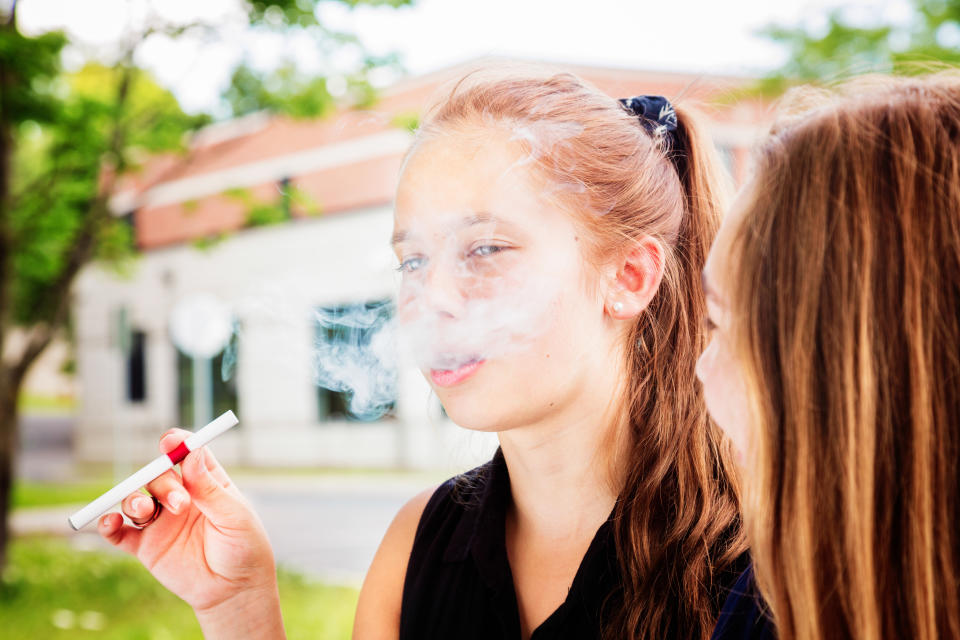Vaping makes teens 5 times more likely to get infected with COVID-19
Teens who smoke or vape may be putting themselves at higher risk of getting the coronavirus, says a new study out of Stanford University. “Our findings from a national sample of adolescents and young adults show that e-cigarette use and dual-use of e-cigarettes and cigarettes are significant underlying risk factors for COVID-19 that has previously not been shown,” the authors write.
Published in the Journal of Adolescent Health this week, the study was conducted using an online survey of 4,351 teens and young adults in the U.S. ranging in age from 13 to 24. All 50 states, the District of Columbia and three U.S. territories were represented by the group, and the researchers adjusted the sample for “confounding factors” such as obesity, race/ethnicity, sex and compliance with stay-at-home orders.

Survey participants were asked about both past 30-day use of cigarettes and e-cigarettes, as well as their lifetime use — and were also asked whether they had experienced symptoms of COVID-19, or received a positive test. While a link between the two was expected, the results were striking.
A COVID-19 diagnosis, the authors found, was five times more likely among those who used e-cigarettes — and seven times more likely among those who used both e-cigarettes and cigarettes. Individuals who had used e-cigarettes and cigarettes in the past 30 days were nearly five times more likely to show symptoms of the virus.
Bonnie Halpern-Felsher, a professor of pediatrics at Stanford University and one of the key authors on the study, said the result was higher than anticipated. “I wasn’t surprised by the findings in general, but I didn’t expect to see a five to seven times higher risk of being diagnosed with COVID-19,” Halpern-Felsher tells Yahoo Life.
Ilona Jaspers, professor of pediatrics and microbiology & immunology at the University of North Carolina at Chapel Hill, and one of the nation’s leading experts on teens and vaping, also found the data compelling. “The finding is certainly novel and of significant impact, but potentially not surprising,” Jaspers tells Yahoo Life. “While it aligns with what many of us have suspected, the data included in this article provide important evidence supporting the potential link between vaping and increased risk for COVID-19.”
As a population study, it did not explore the reason that vaping and smoking may put individuals at higher risk. But Jaspers says part of it may boil down to immune function. “Several previous studies have shown that vaping causes an overall suppression of immune responses in the lung,” Jaspers explains. “Rodent studies have linked exposure to e-cigarettes with increased susceptibility to and severity of other respiratory viruses, such as influenza. Our own studies have shown that several components of respiratory host defense functions can be significantly suppressed by vaping and specific components of e-cigarettes.”
Dr. Panagis Galiatsatos, a pulmonary and critical care doctor at the Johns Hopkins School of Medicine and spokesperson for the American Lung Association, expanded on the concept in an April interview with Yahoo Life. “If you’re putting anything else that isn’t just good air into the lungs, you’re running the risk of these toxins changing the basic molecular structure of the lungs,” Galiatsatos told Yahoo Life. “I’ve seen e-cigarette users who want to quit because they’re having dire health consequences, and the most basic [of their complaints] is, ‘I get a cold and it takes me months to get rid of.’”
Halpern-Felsher says that while decreased immune function may definitely contribute, there may be other factors about vaping that led to an increased risk of COVID-19. “ It might also be that youth vaping/smoking increases exposure to the virus as youth often share their e-cig devices, or the hand-to-mouth action, whereby you can touch the virus and then your hands,” says Halpern-Felsher. “Also, the large plume of aerosol could carry virus in the aerosol and then be breathed in deep in the lungs.”
Given that millions of teens in the U.S. currently vape, Halpern-Felsher hopes the study will be taken as a warning. “I really hope that teens and young adults recognize that vaping and vaping/smoking is harmful and that e-cigs aren’t harmless water or flavored water vapor. There are real consequences to vaping, and I really hope youth won’t start or will stop vaping.”
For the latest coronavirus news and updates, follow along at https://news.yahoo.com/coronavirus. According to experts, people over 60 and those who are immunocompromised continue to be the most at risk. If you have questions, please reference the CDC’s and WHO’s resource guides.
How to maintain your physical and mental health during the pandemic
Taking care of a loved one with COVID-19? Here’s how to stay healthy
Q&A with Dr. Kavita Patel: How to keep your family safe and maintain your mental health
Read more from Yahoo Life
Want daily lifestyle and wellness news delivered to your inbox? Sign up here for Yahoo Life’s newsletter

